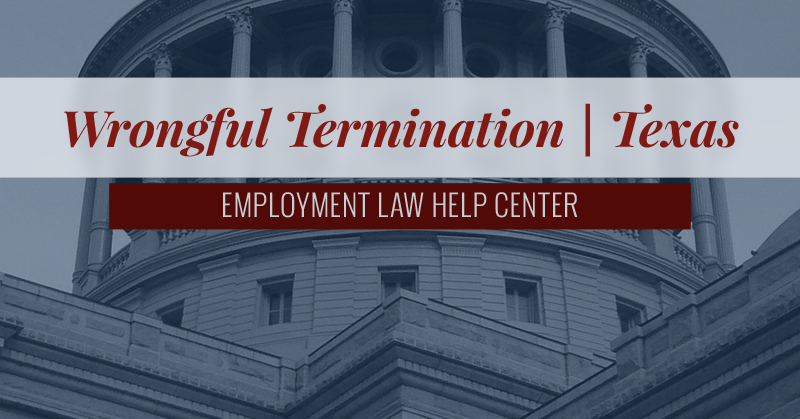Texas Wrongful Termination Law
In at-will states like Texas, it may seem like employers have all the rights, while employees are subjected to the whims of their employer in terms of employment. However, there are wrongful termination laws in Texas that protect employees from being unlawfully discharged from employment because of their religion, age, sex, race, or other membership in a protected class. If your Texas employer fires you for discriminatory reasons, consult a knowledgeable employment law attorney as soon as possible to discuss your legal options. You may have grounds to file a wrongful termination claim against your employer for any damages related to your discharge from employment, possibly including back pay or reinstatement to your position at work.

What is Wrongful Termination?
Texas, like many states, is an at-will state, which means employers have the right to fire an employee at any time, and for any reason, or for no reason at all. However, there are exceptions to the at-will rule that prohibit an employer from discharging an employee on the basis of a protected characteristic. In Texas, protected characteristics include the following:
- Race
- Sex
- Color
- National origin
- Disability
- Age (40 and older)
- Religion
- Pregnancy
- Veteran status
- Citizenship status
- Disability
- Genetic information
In addition to offering special protections for members of these protected classes, Texas wrongful termination laws also make it illegal for an employer to fire an employee for refusing to commit a crime, or for reporting business fraud, unsafe working conditions, wage and hour violations, unlawful behavior, employee discrimination, or sexual harassment.

Texas Laws Prohibiting Wrongful Termination
There are federal laws in place that make it illegal for an employer to fire an employee based on a protected characteristic, but there are also antidiscrimination laws at the state level, and every state’s laws on wrongful termination are different, which can become confusing when pursuing a claim of wrongful termination. As a general rule though, the Texas Labor Code follows the federal standards enforced under the Civil Rights Act of 1964, and other antidiscrimination laws, including the Pregnancy Discrimination Act, the Equal Pay Act, and the Americans with Disabilities Act, for the fair and ethical treatment of employees and employment applicants.
It’s also important to note that only employers with a certain number of employees are subject to federal and state anti-discrimination law. Federal law dictates that most types of discrimination are prohibited once an employer has at least 15 employees, except for age discrimination, for which the minimum is 20 employees, and citizenship status discrimination, for which the minimum is four employees. In Texas, however, companies with 15 or more employees are subject to the state’s anti-discrimination law. While federal anti-discrimination law is regulated by the Equal Employment Opportunity Commission (EEOC), state anti-discrimination law in Texas is regulated and enforced by the Texas Workforce Commission, Civil Rights Division.
Contact a Reputable Texas Wrongful Termination Attorney Today
Texas discrimination and wrongful termination laws provide employers with the framework for the ethical and moral treatment of employees, with strict regulations that prohibit employers in Texas from hiring, firing or treating employees differently on the basis of a protected characteristic. If you were the victim of wrongful termination in Texas on the basis of a protected characteristic, or employment retaliation for reporting unlawful behavior, unsafe working conditions or workplace discrimination, you may have a claim for damages. Contact an experienced Texas wrongful termination lawyer as soon as possible to explore your possible compensation options, as there may be a short statute of limitations for your wrongful termination claim.




